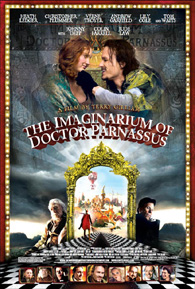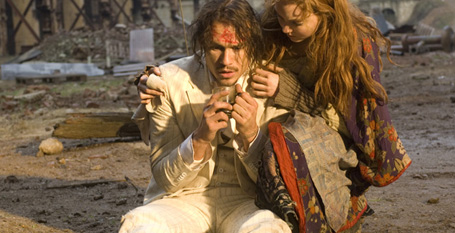As a general rule, a Terry Gilliam film improves vastly the second time you watch it. The first time is always a cinematic experience where you could be just mesmerised by the director’s visual style, fantastic sequences, and surreal humour, but the second viewing always reveals the deep structures and allegorical underpinnings of what appears at the first glance to be an ill-disciplined narrative. There is always a method to his very engaging madness.

By now, you’d already know that this is Heath Ledger’s final movie (and a chilling point: his first appearance in the film was the very last scene he shot). By now, you’d already know it’s about a centuries-old contest between a Dr Parnassus of a travelling vaudeville and the Devil. The game is about winning souls, and the ultimate prize is the doctor’s young daughter. By now, you’d know a mysterious amnesiac, played by Ledger and friends, attempting to balance the asymmetrical war.
It’s fine to just watch this as an adventure movie, though you might catch on that there’s more than meets the eye. The centuries-old contest between Parnassus and Mr Nick isn’t really about good vs evil; it harkens back to the concerns from Gilliam’s 1980s trilogy (Time Bandits, The adventures of Baron Munchhausen, Brazil), which pitted imagination against adulthood, the Enlightenment, and the state.
Parnassus champions the power of imagination against Mr Nick’s temptations of “the easy way out”, but it is more interesting to read this movie as Gilliam’s mid-career philosophical treatise and semi-autobiography on the state of filmmaking, art, and the fight for hearts and minds of audiences in the imaginarium of the cinema. Does one win the audience through appealing to their creativity and imagination, or through pandering to their base instincts and need for easy narratives? Or is it even possible to, as one of the film’s many self-referential lines puts it, “meet the audience in the middle”?
Don’t worry if you don’t understand it all immediately. This film is also a visual treat, with Gilliam reaching out to his Monty Python and 1980s trilogy to create fantastic and surreal worlds those unwitting visitors to the Imaginarium experience.

